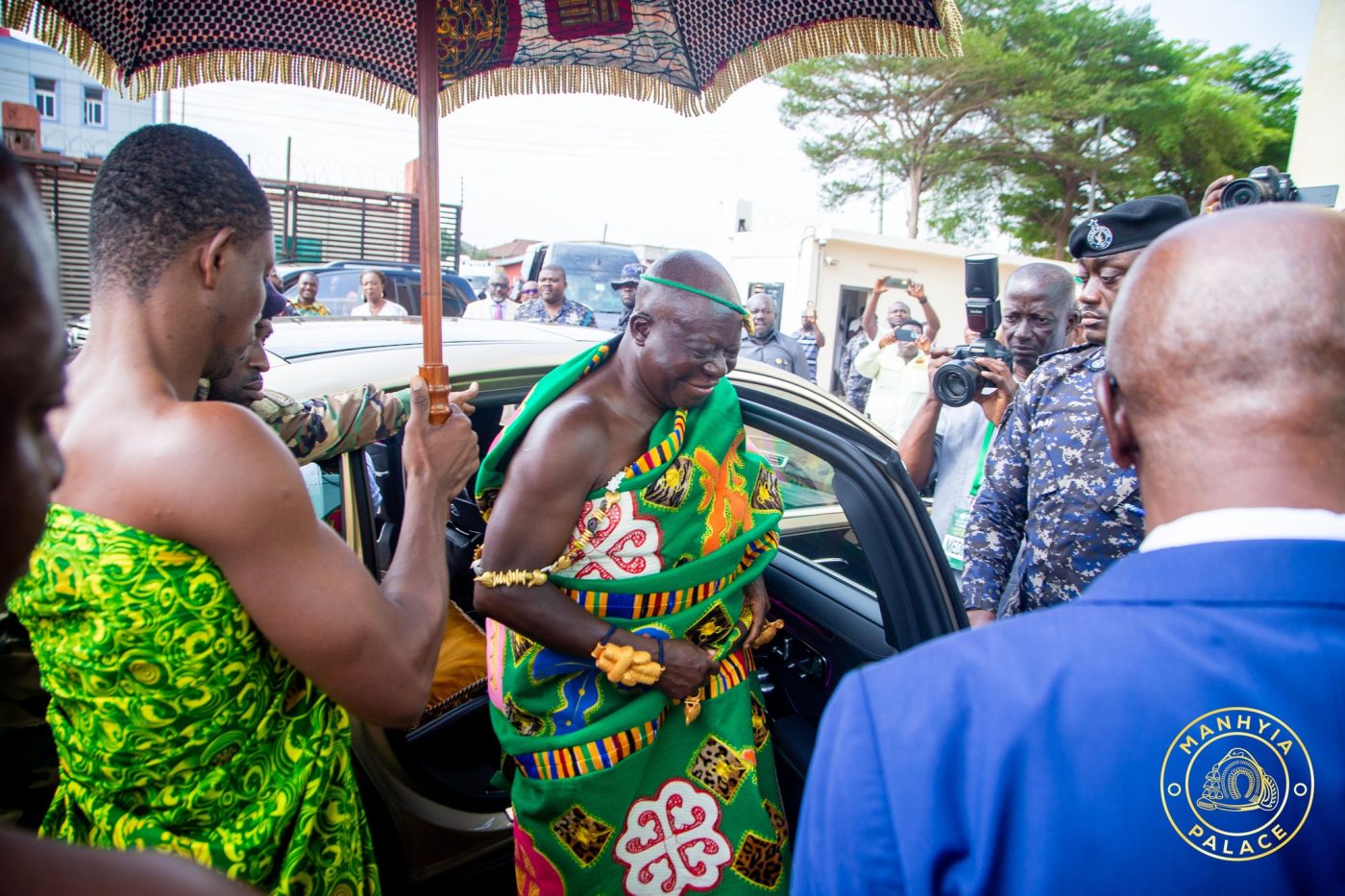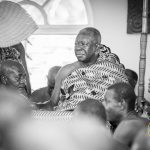Otumfuo Blames Corruption and Politics for Galamsey Surge

The King of the Asante Kingdom, Otumfuo Osei Tutu II, has observed that regulatory failures, political miscalculations and corruption are fuelling the growing prevalence of illegal mining activities in Ghana and Africa.
These elements, in the estimation of the Monarch, make the fight against the menace next to unsuccessful.
“It cannot be denied that a cocktail of regulatory failures, political miscalculations and corruption have combined to make the task of curbing the menace more challenging,” Otumfuo said on June 2, 2025, during the first day of the three-day Mining in Motion Summit in Accra.
The King in his address urged stakeholders to capitalise on the opportunity to dissect the policy options and tools available to deal with the problem.
“I feel sure it is within the capacity of this gathering of industry experts, end users and policymakers to fashion out solutions that work for the good of the nation.”
The summit organized by the Ashanti Green Initiative in collaboration with the Ministry of Lands and Natural Resources is under the theme, “Sustainable Mining & Local Growth – Leveraging Resources for Global Impact.”
The event drew together miners, refiners, traders, regulators, NGOs, financial institutions, academia, policymakers and traditional leaders to forge a real practical solution for the future of Africa’s mining sector.
Present at the event were President John Dramani Mahama, former President John Agyekum Kufuor, businessman Ibrahim Mahama, mining mogul Sir Sam Jonah, Minister for Lands and Natural Resources Emmanuel Armah Kofi Buah, Secretary General of AfCFTA, Wamkele Keabetswe Mene, Minister for Environment, Science, Technology and Innovation Ibrahim Murtala Mohammed and Minister for Local Government, Chieftaincy and Religious Affairs Ahmed Ibrahim.
In a welcome address, the Chief Executive Officer of Ashanti Green Initiative, Oheneba Kwaku Duah said the summit was a moment to reflect, reset and reshape the future of mining in Ghana.
Distraction
The Asantehene’s speech further highlighted the diversion of national and continental attention from the bright prospects of mining to avoidable pitfalls of illicit mining.
According to the King, Africa’s mineral wealth is not reflective of its economic prospects as it has been reduced to paupers surviving on aid.
“Probably the most costly effect of illicit mining has been the distraction from the real challenge we face which is how we maximise the benefits of our noble heritage. Here, we have to be true to ourselves and admit that we have not done a good job of representing and protecting ourselves in the competitive global market.”
“When the statisticians tell us that mining has contributed an average of 12.3% to GDP and been the largest employer of labour in Ghana, they seem impressive. But how many of us—policymakers as well as social thinkers—have tried to assess the true value of the resources we dispense? How many have followed the value chain to the final consumer to calculate the true value of what we sell as raw materials?”
His Majesty posited that the statistics are only a pittance of the true value of the resources delivered to the market while the real wealth flows from the value which is added along the so-called value chain.
“But we are painfully excluded from this juicy portion of the value chain because the industries in the manufacturing process to whom we sell the raw materials are only located in the already rich countries.
“In this scenario, it is impossible to deny the contention that some sweat to eke out the crumps while others cream the milk. Indeed, even the Gold Market has been characterised as split between the Golden Rich of the end-user world and The Gilded Paupers of the producer nations.”
Otumfuo characterises this inequity as untenable and unsustainable and thereby encourages the demand for investment in partnerships in producer countries for the establishment of manufacturing industries.
“It may seem, on the surface, a curious request to make seeing this would inevitably lead to the industrial world having to cede or lose a substantial part of its market share of manufactured goods. But that is precisely what needs to be done if the world is to contain the consequences of the inequities of the present.”
Reforms
President Mahama in his speech could not agree more with Monarch as he acknowledged that Ghana’s mineral wealth had not translated into the transformation of citizen’s lives enough.
From retrospection and introspection, he said the extractive structure was accounting for the uncorrelatable economic fortunes.
“We export raw materials, raw minerals and we import finished products but the real value which is jobs, technology and revenue is captured elsewhere.”
He committed to investing in the downstream industry and adding value to the country’s minerals as a solution.
“My administration is committed to moving beyond extraction to transformation and this means that we will be investing in the downstream industry in the mineral value chain, refining our gold and developing our jewellery industry, processing our bauxite into aluminium and alumina and, converting lithium into battery components for export and using an iron to feed the steel industry.”
Additionally, he suggested integrating mining into the broader economic framework, linking it to the manufacturing, energy, logistics and research to build resilient and diversified economies.
“We therefore believe that there should be increased participation and investment from Ghanaians in exploiting our mineral wealth. We welcome foreign investors to partner with us. We want a partnership of mutual benefits and we commend the relationship we currently enjoy with partners”
Building on this, the President announced plans to codify the government’s thoughts concerning increased Ghanaian participation using vehicles like our stock exchange and other instruments.
He also mentioned inclusive mining by formalising the small-scale mining sector through initiatives such as corporative mining and skills development programmes, the Ghana landscape restoration and small-scale mining project.
These initiatives aim to provide legal access to land, training, equipment and shared infrastructure. We also will eliminate the use of mercury and support environmentally safe alternatives for mining.
Galamsey Fight
President Mahama further outlined his government’s carved-out strategy to clamp down on illegal mining which has ravaged the mining sector.
First, he said the government was working on sanitizing water bodies and forest reserves.
“Our River Guards are working on clearing mining activities in our water bodies and on the banks of our rivers. We have successfully cleared illegal miners eight out of our nine zone forest reserves.”
Acknowledging poor governance and enforcement as contributing factors to the prevalence of illegal mining, he said the government was strengthening environmental, social and governance frameworks across the mining sector.
This, he said, will include banning toxic chemicals in gold processing like mercury, mandating site rehabilitation, enforcing community development agreements and promoting renewable energy use in the mining sector.
“Mining cannot be sustainable unless it’s responsible. Environmental degradation, water pollution and community displacement are not evitable by-products of mining.”
Meanwhile, he said efforts are underway to reclaim destructed forest reserves and restore the purity of water bodies in collaboration with small-scale miners.
Additionally, he announced a policy to get excavator importers to get permits before importation into the country.
“We will track excavators to know If they are being used for Illegal mining or not and we intend to change the permitting regime. You will not be allowed to import an excavator unless you get a permit to ship one in.”
Source: https://opemsuo.com/author/hajara-fuseini/



